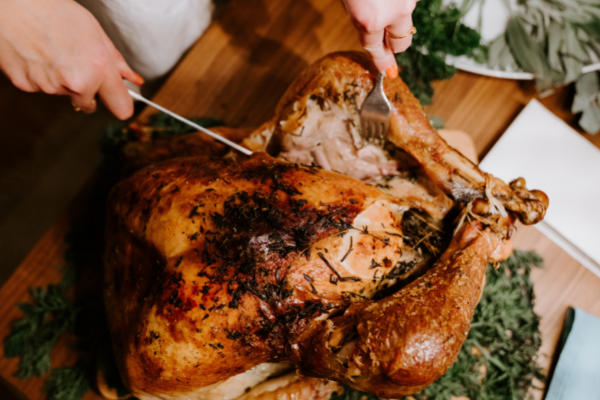Annually, holidays are some of the busiest days emergency rooms see. Thanksgiving 2016 saw an estimated 36,729 people nationwide visit the ER on Thanksgiving alone. From holiday traffic to unsafe food consumption, holidays can be more dangerous than you’d think. In preparation for Thanksgiving this year, learn how to avoid food poisoning and how to safely cook your holiday turkey!
Tips To Safely Handle Your Holiday Poultry
Avoid Cross-Contamination
Cross-contamination occurs when harmful bacteria come into contact with other substances. What this means in the kitchen is that when you handle raw foods, it’s important to thoroughly wash your hands, cooking spaces and cooking utensils. Raw egg, meats and shellfish are some of the most common foods you should be cautious of while preparing. If you are around someone with gluten intolerance or sensitivity, such as celiac disease, you should follow the same cleaning procedures.
Ensure Your Turkey Is Thawed Properly
Make sure your turkey is safe for Thanksgiving dinner by thawing it safely! Unhealthy bacteria can begin to grow once your turkey is left out at room temperature. This is known as the “Danger Zone” where foodborne bacteria will begin to grow quickly (between 40 and 140 degrees Fahrenheit). Some safe thawing methods include:
- Refrigerator thawing
- Coldwater thawing
- Microwave thawing
Be sure you know how far in advance you need to start thawing your turkey!
Fully Cook Your Turkey
Ultimately, your dinner bird should reach an internal temperature of 165 degrees Fahrenheit! Any lower and you risk consuming undercooked poultry. Variables like stuffing, pan depth and how large your turkey is can influence its time in the oven.
Responsible Alcohol Consumption
We know that a glass of wine pairs perfectly with a nice holiday meal! However, be careful not to overdo it. For example, women should limit themselves to 1 alcoholic beverage in a day. Men should consume up to 2 alcoholic beverages in a day.
Groups who should not consume any alcohol include:
- Pregnant women
- Those under legal drinking age
- Anyone with certain medical conditions or taking medications that interact with alcohol
- People recovering or suffering from substance abuse
Food Poisoning
No one wants food poisoning after the holidays! Avoid unpleasant symptoms by:
- Washing your hands and cleaning surfaces before, during and after food preparation
- Avoid cross-contamination by separating raw foods from ready-to-eat foods
- Make sure you’re cooking foods to the correct internal temperature
- Always refrigerate food within 2 hours of cooking
Groups Most At Risk
Certain groups of people may be more at risk of food poisoning than others.
- Adults aged 65 and older
- Children younger than 5
- Those with weakened immune systems
- Pregnant woman
Remember, Comanche County Memorial Hospital’s Drewry Family Emergency Center will be open this Thanksgiving! If you or someone in your home needs emergency medical assistance, please immediately seek aid by visiting the Drewry Family Emergency Center or calling (580) 585-5555.
Disclaimer
The Comanche County Memorial Hospital website does not provide specific medical advice for individual cases. Comanche County Memorial Hospital does not endorse any medical or professional services obtained through information provided on this site, articles on the site or any links on this site. Use of the information obtained by the Comanche County Memorial Hospital website does not replace medical advice given by a qualified medical provider to meet the medical needs of our readers or others. While content is frequently updated, medical information changes quickly. Information may be out of date, and/or contain inaccuracies or typographical errors. For questions or concerns, please contact us at contact@ccmhhealth.com.
Sources.
Business Insider. https://www.businessinsider.com/why-thanksgiving-emergency-room-visits-spike-doctors-2017-11
Centers for Disease Control and Prevention
https://www.cdc.gov/foodsafety/keep-food-safe.html
https://www.cdc.gov/foodsafety/symptoms.html
https://www.cdc.gov/foodsafety/people-at-risk-food-poisoning.html
https://www.cdc.gov/alcohol/fact-sheets/moderate-drinking.htm
Food Safety And Inspection Service. https://www.fsis.usda.gov/food-safety/safe-food-handling-and-preparation/poultry/turkey-basics-safe-cooking
Food Safety And Inspection Service. https://www.fsis.usda.gov/food-safety/safe-food-handling-and-preparation/poultry/turkey-basics-safe-thawing

